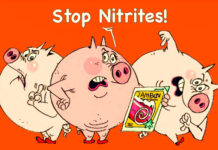Plant-derived ingredients, as noted above, can serve a variety of functions in a wide variety of foods. Also that of preserving meat products. A note from the Ministry of Health offers some clarification on this issue.
Some fiber and plant extracts (in particular, from spinach and leafy greens) naturally contain nitrates. Which in turn turn into nitrites, whose function is to protect processed meats from microbiological contamination (e.g., botulinum toxin). To replace chemical preservatives such as potassium nitrite (E 249) and sodium nitrite (E 250). (1)
The Ministry of Health is a pioneer in Europe in addressing this issue with commendable courage. Director General Giuseppe Ruocco – by his own note DGISAN 12.9.17, no. 36275 (see Appendix) – did indeed allow the use of fiber and plant extracts in the processing of meat products.
The approach is pragmatic and consistent with both the objectives of the Hygiene Package, (2) and current developments in meat research and development. (3) Under the auspices of improving product characteristics, including through the use of natural and functional ingredients.
In food labeling,” the Ministry points out, “it is essential to specify the nature of the plants from which fibers, extracts and concentrates come. (4) And most importantly, in compliance with the basic criteria on fair information practices, (5) claims such as ‘no additives,’ ‘no preservatives,’ ‘no nitrites’ should not be used. As untrue or otherwise potentially misleading. (6)
The reasoning is crystal clear, the use of plant-derived ingredients with specific functionalities can be allowed, subject to the general and specific criteria of food safety and proper consumer information. Clean labels must therefore be complete and truthful. If anything, communicating the presence of ‘only natural preservatives’ where appropriate.
Europe meanwhile is groping in the dark. ConsumAtors are demanding ‘natural’ foods, clean labels, thus stimulating the supply of foods without ‘E…’, with plant-based ingredients. Preservatives and antioxidants, but also coloring foods. However, this positive market development is orphaned by rules at the EU level. And in the puzzle of national regulations, a country like Germany has gone so far as to ban the use of such ingredients on meat products because they are not authorized as food additives. (7)
Dario Dongo
ANNEX – Note Min Health 12set17 – withoutconservatives
Notes
(1) The use of nitrites in cooked ham, for example, is stipulated in the appropriate DM 21.7.05 (as amended by DM 26.5.16). Although its compulsoriness may come into doubt, where identical function can be accomplished by nitrites of different origin – such as plant nitrates – which certainly do not alter the nature of the product with respect to the requirements
(2) See reg. EC 852, 853/04 et seq. The Hygiene Package focuses on risk analysis, which must form the basis of any measures on food and beverages
(3) As early as 2012, among other things, the European Commission co-funded thePhytome research project(Phytochemicals to reduce nitrite in meat products). For the specific purpose of identifying useful phyto-derivatives to replace nitrite. V. http://www.phytome.eu/v2/overview.html
(4) In line with the requirements of reg. EU 1169/11, ed.
(5) See reg. EU 1169/11, Articles 7 and 36
(6) Taking into account, among other things, that some locutions could be qualified as health claims and thus fall under the scope of reg. EC 1924/06
(7) The Bundesverwaltungsgericht, Federal Administrative Court, recently ruled along these lines. According to which, plant-derived ingredients with high nitrate content-used for and their preservative and coloring functions-should come under specific authorization, according to reg. EC 1333/08. Decision 10.12.15, BVerwG case 3 C 7.14, at http://www.bverwg.de/en/101215U3C7.14.0
Dario Dongo, lawyer and journalist, PhD in international food law, founder of WIISE (FARE - GIFT - Food Times) and Égalité.








